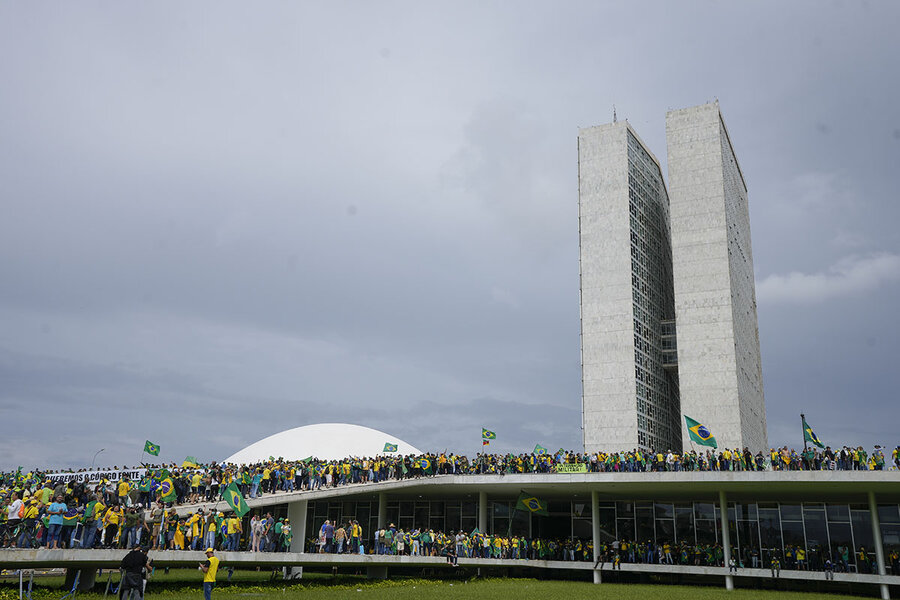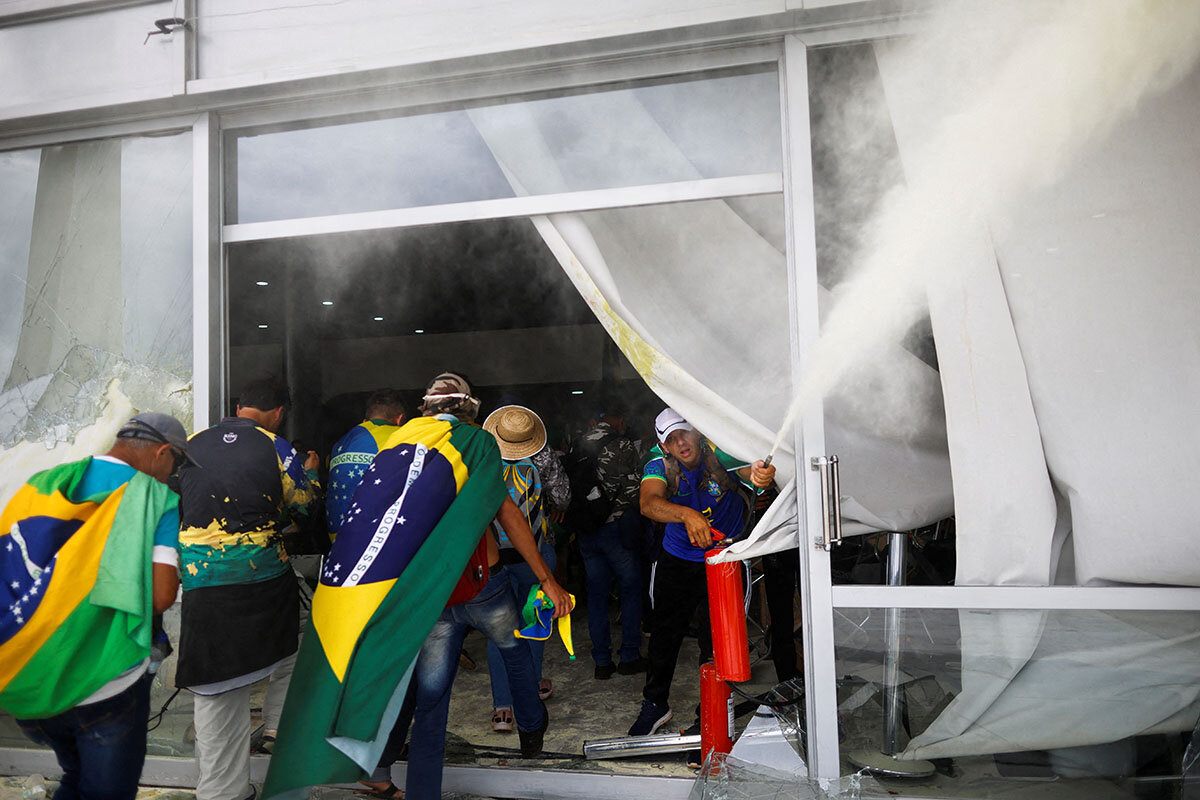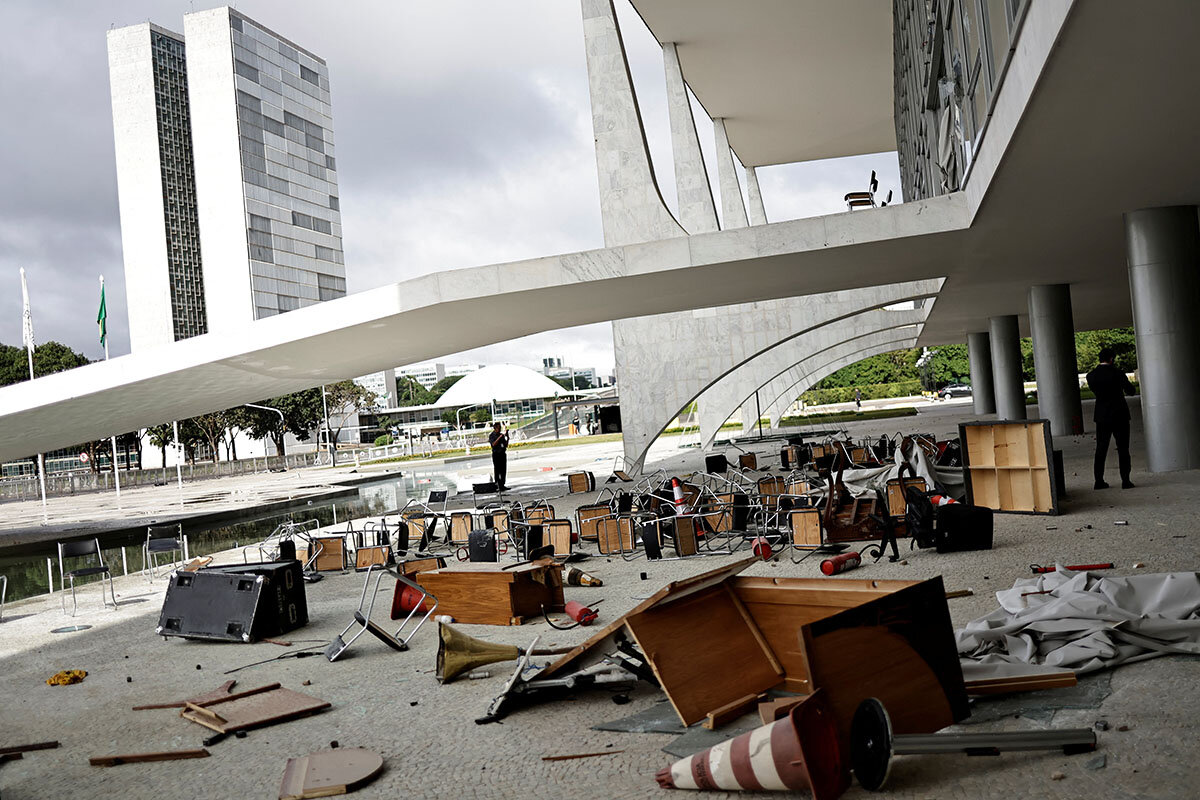Brazil’s ‘Jan. 6’ is a hit to democracy – but could it also bolster it?
Loading...
| Mexico City
Windows smashed, the halls of Congress destroyed, and hundreds of furious citizens storming the country’s capital to fight what they say was a stolen presidential election: This might seem a recap of the Jan. 6 insurrection in the United States. Instead, almost exactly two years later, Brazil witnessed an uncannily similar event over the weekend, throwing the stability of its democracy into question and presenting tall hurdles for President Luiz Inácio Lula da Silva just one week into his new term.
For months, political analysts have warned that Brazil could face something similar to Jan. 6. Much like former President Donald Trump, former Brazilian leader Jair Bolsonaro spent years sowing unfounded doubts about Brazil’s electronic voting system. Mr. Bolsonaro never explicitly recognized his loss in a razor-thin October 2022 presidential runoff; following his loss, highways were blocked, and for weeks military buildings across the country were surrounded by small groups of pro-Bolsonaro protesters insisting the election was invalid.
Now Brazil has been violently jolted by the realities of its deeply divided populace. Sunday’s attack is seen as the gravest threat to Brazilian institutions since its return to democracy in the 1980s, and the country faces the daunting question of how to move forward from here.
Why We Wrote This
The storming of Brazil’s state institutions by those unhappy with election results appears to mimic the Jan. 6 insurrection in the U.S. It is a wake-up call for Brazilian leadership about the perils of polarization.
But unlike the U.S. two years ago, Brazil has already sworn in its new president. And the swift reaction of the federal government, from condemning the attacks to suspending the pro-Bolsonaro governor of Brasília for 90 days while an investigation takes place into security failings in the capital, sends a clear message that President Lula won’t let the destruction and attacks on democracy slide. In some ways, the aftermath shows that Brazil’s democracy itself may be sturdier than previously understood.
“Brazil’s democracy has proven it’s stronger than people thought,” says Thomas Trebat, director of Columbia University’s Global Center in Rio de Janeiro, who points to a stable tradition of free press, an independent Congress and Supreme Court, and a vibrant civil society. “You can see the repudiation of the rioters; you can see the strength of those institutions. But it’s not invulnerable, and I think the government is going to have to be very vigilant,” he says, underscoring Brazil’s history of military dictatorships.
“Fanatical fascists”
President Lula arrived to evaluate the damage in Brasília Sunday night. “These vandals, who we could call ... fanatical fascists, did what has never been done in the history of this country,” he said in a press conference. “All these people who did this will be found and they will be punished.”
Some 1,500 protesters – many clad in the vibrant yellow and green colors of the Brazilian flag – have been detained since Sunday, and capital police are under the microscope for their inability to halt the rioting in Brasília.
Lula, as he is commonly called, has a long track record as an established politician and leader; this is his third, nonconsecutive term as president of Brazil. But his reputation was tarnished by corruption scandals under previous administrations, and after Sunday’s riots, some see an even steeper uphill battle to govern.
The protests pose a “sinister threat” to Brazil’s democracy, says Robert Muggah, co-founder of the Igarapé Institute, a Brazilian think tank focused on security and development. “While it may unify parts of society against the radical fringe, it could also deepen polarization in this already bitterly divided country. Many ... feel emboldened by their assault on the capital.”
“The parallels between this week’s violent protests in Brazil and the U.S. insurrection two years ago are by design not default,” Dr. Muggah says. “The targeting of the National Congress, Supreme Court, and presidential palace was not spontaneous. ... Conspiratorial plots and appeals for a military coup [have] been circulating on far-right social media channels for months.”
Yet the attack could end up consolidating President Lula’s authority in the eyes of the populace, argues Andre Pagliarini, assistant professor of history and Brazil expert at Hampden-Sydney College in Virginia. “I see this as a moment of moral rallying for this government. It underscores Lula’s legitimacy, which could be politically powerful: He clearly won the election. He’s clearly the rightful leader. It’s in his rights to defend democratic order,” he says. “This gives the government a real leg to stand on in governing the next few days, weeks, and months ahead.”
One week after Lula’s inauguration, protesters began gathering Sunday morning on the lawns in front of Congress and down the central avenue that’s flanked by government ministries and national monuments in Brasília. By roughly 3:30 p.m. local time, initial reports of the invasion broke on Brazilian news sites, but it took about three hours for security forces to retake the three breached buildings, which included the Supreme Court and presidential palace. Inside, angry protesters ransacked spaces where justices discuss cases and decisions, a deeply symbolic target as the court was seen as a thorn in the side of Mr. Bolsonaro. They destroyed priceless artwork by national talent, like modernist painter Emiliano di Cavalcanti and sculptor Bruno Jorge, and set off sprinkler systems.
“We need to reestablish order after this fraudulent election,” one demonstrator named Lima, a young production engineer, told AFP news agency Sunday. “I’m here for history, for my daughters,” she said.
Global condemnation
International leaders have condemned the attacks, including U.S. President Joe Biden, Mexican President Andrés Manuel López Obrador, and Canadian Prime Minister Justin Trudeau, who issued a joint statement Monday saying they “stand with Brazil as it safeguards its democratic institutions.”
Although Sunday’s chaos was largely contained to the capital, tent cities have popped up across the country since the election, made up of Brazilians convinced the presidential vote was stolen. Mr. Bolsonaro, who lost by just 2 percentage points on Oct. 30 last year, left Brazil in late December, just days before the transition of presidential power. He is believed to be in Florida and denounced yesterday’s attacks on Twitter, denying any responsibility.
For many Brazilians, Sunday’s attack is a wake-up call for more functional governance needed ahead. “For Brazil to see better days, everyone needs to unite,” says Lucas Rocha, a martial arts teacher who voted for Lula. Mr. Rocha is from an impoverished neighborhood in Rio de Janeiro, and says he represents the non-privileged people who wanted a change from Mr. Bolsonaro.
“We all need to get behind Lula ... so things can get better for Brazilians,” he says. “But it’s going to be really hard. The left and the right are in a full-out war nowadays. They can’t speak to each other.”
Anthony Borneo, a jewelry store owner in Rio de Janeiro who abstained from voting last fall sees the violence as a result of the nation’s deep divides.
“The right is thrashing things now, like spoiled children, because they lost,” he says. But, “before, the left used to do the same thing. To me, they’re all the same.”
Lula has recognized the deep divisions he inherited as president, pledging in his acceptance speech to govern for all Brazilians. “There are not two Brazils. We are a single country, a single people, a great nation,” he said.
“He wants to govern for everyone, including those who didn’t vote for him,” says Clara Morais, a high school senior in Rio de Janeiro, on Monday. But it’s going to be tough for everyone to make that goal a reality, she says.
“These people, who are the minority, want to speak for the majority.”
Ana Ionova contributed reporting from Rio de Janeiro.








